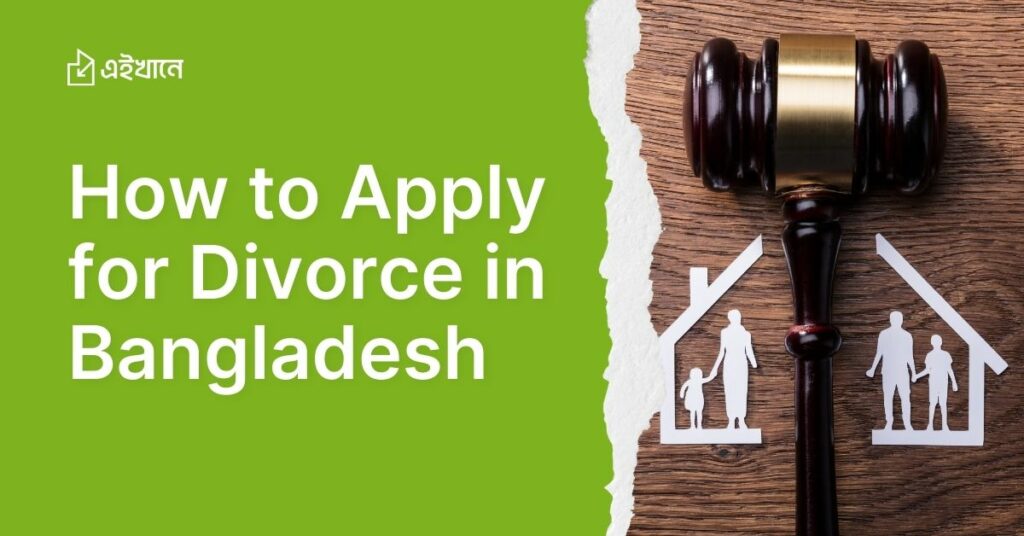Understanding the Legal Process: A Comprehensive Guide to Divorce in Bangladesh
Marriage Laws Governing Divorce in Bangladesh
The legal framework for divorce in Bangladesh is rooted in several laws, depending on the religion of the parties involved. The primary laws include the Muslim Family Laws Ordinance (MFLO) 1961 for Muslims, the Hindu Marriage Special Divorce Act 1946 for Hindus, and the Divorce Act 1869 for Christians. Each law outlines specific legal procedures and grounds for divorce, making it essential to understand the applicable law before proceeding.
Grounds for Filing Divorce
Different religions have different grounds for divorce. Under Muslim law, divorce can occur through mutual consent or by one party initiating the process. Grounds such as cruelty, desertion, or adultery may also be cited. For Hindu marriages, divorce is granted only under certain conditions such as desertion or cruelty. The Divorce Act 1869 allows Christian couples to file for divorce based on adultery, conversion to another religion, or other grounds accepted by the court.
Notifying the Union Parishad Chairman for Legal Proceedings
In cases involving Muslim marriages, the divorce process begins with the service of notice to the Chairman of the local Union Parishad. This step is vital because the Chairman will initiate a reconciliation process between the spouses. The notice must be provided in writing, and both parties will be summoned for a meeting to attempt reconciliation.
Mediation and Reconciliation Requirements
According to Bangladeshi law, after serving the notice to the Union Parishad Chairman, a mandatory 90-day reconciliation or mediation period begins. During this time, both parties are encouraged to amicably resolve their differences. If reconciliation fails after the 90-day period, the official divorce process can proceed further, and the divorce becomes final.
Documentation Needed for Divorce Application
Proper documentation plays a crucial role in ensuring the smooth processing of a divorce application. The necessary documents typically include an original copy of the marriage certificate, identification papers (such as the National ID or passport), and the written notice of divorce. In addition, financial or property agreements, if any, should also be prepared in advance for submission to the concerned authorities.
Child Custody Considerations
In the case of a marriage involving children, custody issues must be settled as part of the divorce proceedings. The courts generally consider the best interests of the child while making custody decisions. Both parents may be awarded joint or sole custody, depending on factors like the parent’s ability to care for the child and the child’s welfare.
Alimony and Maintenance Rights
Alimony, or maintenance, may be awarded to a spouse based on various factors, such as the length of the marriage, the financial status of both parties, and the presence of children. Maintenance can be temporary or permanent, and the amount is determined by the court. Under Muslim Law, a bride is also entitled to her dower (Mahr), which must be paid upon divorce.
Appeal and Contested Divorce Cases
In some cases, a divorce may not proceed smoothly, especially if one party contests the divorce or disagrees with the terms of separation. An appeal can be filed in higher courts if either party is dissatisfied with the lower court’s decision. However, contested divorces tend to take longer as the case goes through several stages of legal scrutiny.
Religious and Social Implications of Divorce
Divorce in Bangladesh often carries significant social and religious implications, especially in more conservative communities. Many individuals face societal stigma, familial conflicts, and emotional distress. It is crucial, therefore, to seek support from legal professionals, counselors, and family members during this tumultuous period.
5 Key Steps to Filing for Divorce in Bangladesh: Expert Advice
Step 1: Serve Notice of Intention to Divorce
For Muslim marriages, the first formal step in the divorce process is serving a written notice to the local Union Parishad Chairman. This notice should clearly express the intention to dissolve the marriage and must be signed by the spouse initiating the divorce. It is essential to provide accurate information in this document to avoid future legal complications. Once delivered, the Chairman will notify the other spouse and begin the reconciliation process.
Step 2: Participate in the Reconciliation Process
Under Bangladeshi law, a mandatory 90-day reconciliation period follows the submission of the notice to the Union Parishad Chairman. During this time, both parties are encouraged to attend mediation sessions organized by the Chairman. These proceedings aim to resolve disputes amicably, either to resume the marriage or to consider mutually agreed terms for separation if reconciliation proves impossible.
Step 3: Submission of Required Documentation
To proceed with the divorce legally, all required documents must be submitted to the appropriate authorities. Typically, these documents include the original marriage certificate, a copy of the written divorce notice, and proof of identity, such as National ID cards or passports. Additional documents, such as financial disclosures or property agreements, may also be requested depending on the complexity of the divorce case.
Step 4: Finalize Child Custody and Maintenance Agreements
If children are involved in the marriage, arrangements regarding their custody and maintenance must be thoroughly discussed and agreed upon before the divorce is finalized. Courts in Bangladesh prioritize the best interests of the child when making decisions on which parent receives custody. Financial obligations, such as child support or spousal maintenance, are also determined based on the couple’s financial situation and the children’s needs.
Step 5: Obtain Formal Written Divorce Certificate
Once all conditions are met, including the completion of the 90-day mediation period without reconciliation, and after resolving matters like custody and maintenance, the final step is obtaining a formal divorce certificate. This legal document is issued by the relevant government authority and signifies the official dissolution of the marriage. The spouse initiating the divorce can proceed with life post-divorce under the law, with all entitlements accurately recorded.
Navigating the Paperwork: Essential Documents for Divorce Applications in Bangladesh
Original Marriage Certificate
One of the most critical documents you will need when applying for a divorce is the original copy of your marriage certificate. This document serves as legal proof of the marriage and provides essential details such as the date and place of the union. Authorities will not process your divorce application without this certificate, so ensure you have it available from the beginning of the procedure.
National Identification or Passport
Both parties must submit identification documents to verify their identity during the divorce process. In Bangladesh, a National ID card or passport is typically used for this purpose. These documents serve as official proof of identity and residency, which are necessary for legal proceedings. Make sure that your ID is up-to-date and intact to avoid delays in processing.
Written Notice of Divorce
For Muslim couples, a written notice declaring one party’s intention to divorce is mandatory. This notice must be served to both the spouse and the Union Parishad Chairman in the local area. The notice should clearly state the reason for filing for divorce and include the signature of the person initiating the process. Once received, this document triggers the 90-day reconciliation phase mandated by law.
Property and Financial Agreements
If there are any joint properties or financial arrangements involved in the marriage, these must also be addressed during the divorce process. Both parties may need to submit documents related to assets, liabilities, bank statements, and any prenuptial or postnuptial agreements. Proper documentation helps in determining the distribution of property and the possibility of spousal maintenance or alimony.
Proof of Child Custody Arrangements (if applicable)
In cases where children are involved, you must present documentation reflecting the agreed-upon custody arrangements, or orders issued by the court if an agreement cannot be reached. This includes details about who will retain custody, visitation rights, and financial support. Courts prioritize the best interests of the child, so supporting documents, such as school records or health information, may also be required.
Divorce Certificate Application
Once all required documents are submitted and the 90-day period for reconciliation has passed without resolution, the next step is applying for your formal divorce certificate. This application must be submitted to the appropriate government authorities, along with any supporting paperwork already provided. The divorce certificate legally finalizes the dissolution of the marriage and serves as an official record for future use.
What to Expect: Timeline and Procedures for Divorce in Bangladesh’s Legal System
The Initial Notice and Reconciliation Period
The divorce process in Bangladesh officially begins when the spouse intending to dissolve the marriage serves a notice of divorce to the local Union Parishad Chairman. This step is mandatory under Muslim Family Laws Ordinance (MFLO) 1961 for Muslims. After the notice is submitted, a 90-day reconciliation or mediation period starts, during which both spouses are encouraged to resolve their differences. No legal proceedings move forward until this compulsory period has elapsed. For Hindu and Christian marriages, while reconciliation efforts may be attempted, the timelines differ based on the specific law governing the religious group.
Completion of the 90-Day Mediation Period
Once the 90-day reconciliation period concludes without a successful resolution, the divorce process can proceed. At this point, the spouses are considered legally separated if no mutual agreement has been reached. For Muslim couples, the Union Parishad Chairman will issue a certificate stating that reconciliation attempts failed, allowing the official divorce procedure to continue. In non-Muslim cases, the timeline may vary, and court approval is often necessary before moving forward.
Filing Legal Documents with the Court
During or after the reconciliation period, if the couple cannot reconcile, they must prepare and file additional documentation to formalize the divorce. This includes submitting the original marriage certificate, identification document copies, and proof of service of the initial notice of divorce. If there are children or joint assets, additional legal paperwork detailing custody agreements or property divisions must also be submitted at this stage.
Dealing with Contested or Uncontested Divorce
If both parties mutually agree to the terms of the divorce, the process is regarded as uncontested and can proceed relatively smoothly. However, if either party contests the divorce or disagrees with issues like child custody, alimony, or asset distribution, the timeline can extend significantly. In contested divorces, the case will move through several court hearings, possibly extending the finalization period by months or even years, as the court works through the disputed issues.
Obtaining the Formal Divorce Certificate
After all legal steps have been followed, including the submission of required documents and the resolution of disputes related to property or children, the final step is obtaining the formal written divorce certificate. For Muslim divorces, this document is issued by the Union Parishad after the 90-day waiting period and ensures the legal dissolution of the marriage. In the case of Hindu or Christian divorces, the court issues the decree following its ruling on the case.
Appeals and Delays in Finalizing Divorce
In some instances, one party may choose to appeal the decision if they are dissatisfied with the terms of separation or a court ruling. If an appeal is filed, the divorce process may be delayed even further, as the case will need to be reviewed by an appellate court. This can result in longer timelines for finalizing the divorce and issuing the divorce certificate.
Protecting Your Rights: Important Considerations When Applying for Divorce in Bangladesh
Understanding Legal Grounds Relevant to Your Case
Before initiating the divorce process in Bangladesh, it is crucial to familiarize yourself with the legal grounds applicable under your religion. For instance, Muslim couples can file for divorce based on several grounds, such as cruelty or desertion, while Hindu divorces adhere to stricter conditions like proven cruelty. Ensure you understand which grounds legally support your case and seek professional legal advice to avoid complications in court.
Right to Alimony and Financial Support
A significant aspect of divorce proceedings involves the right to alimony or maintenance, especially if one spouse has been financially dependent. In Bangladesh, the court determines alimony based on factors like the duration of the marriage, the earning capacity of both spouses, and whether children are involved. Under Muslim law, women are also entitled to their dower (Mahr). Therefore, ensure that your financial entitlements are clearly outlined and documented when filing for divorce.
Child Custody Rights and Responsibilities
If children are involved, one of the most critical concerns during a divorce is custody. Courts in Bangladesh prioritize the best interests of the child when making decisions, meaning custody is generally awarded to the parent who can best provide for the child’s well-being. Both parents may share joint custody, or one parent may be granted sole custody. It is essential to fully understand your rights as a parent, and how custody agreements will impact your life post-divorce.
Division of Marital Property and Assets
The division of assets and property is another important consideration during a divorce in Bangladesh. If you and your spouse hold any joint properties, businesses, or assets, proper documentation will help clarify ownership and distribution after divorce. The courts typically aim to distribute marital assets fairly, leaning towards equitable rather than equal division. Be prepared to submit evidence of ownership and asset value to protect your rights throughout this stage.
Mediation and Reconciliation Options
In Bangladesh, the law mandates a 90-day reconciliation period after notifying the Union Parishad Chairman of your intent to divorce for Muslim marriages. During this time, couples are encouraged to resolve their disputes amicably. Participation is highly recommended as it offers a chance to settle issues like financial arrangements or visitation rights out of court, reducing the stress of litigation. Understanding the mediation process can protect your interests while minimizing conflict.
Legal Representation and Court Procedures
Hiring an experienced lawyer familiar with Bangladeshi family law is essential when filing for divorce. A lawyer can guide you through each step, from filing notices to ensuring that your rights to alimony, property, or custody are protected. In contested divorces, where disputes arise around terms of settlement, your legal representation will be crucial in securing a favorable outcome. Make sure to choose an attorney who specializes in family law to avoid delays and complications.
Appealing Unfavorable Rulings
If you are dissatisfied with the court’s ruling regarding child custody, alimony, or property division, you have the right to appeal to a higher court. An appeal must be filed within the designated time frame, so it is essential to consult your lawyer immediately if you wish to challenge a decision. The appeals process can be lengthy, but it provides a valuable avenue for ensuring that justice is served fairly in your divorce case.


